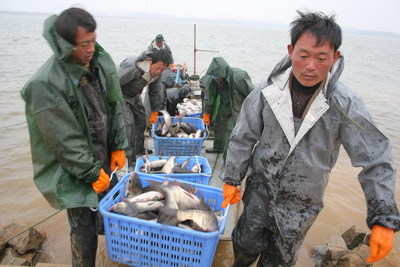New fishery standards in pipeline
Updated: 2007-12-25 07:09
The country's first fishery production standards will be introduced next year as part of efforts to ensure food quality, officials have said.
|
|
The new standards will include 100 items and focuses on those most relevant to fishery products safety, including fish breeding, quality inspection, disease prevention and reporting and fishery feed and drug usage, Vice-Minister of Agriculture Niu Dun said yesterday.
Niu was speaking at an annual aquatic food production conference in Beijing.
Experts have said that a considerable number of fishery products in the country still come from unregulated fishermen and small-scale farms.
"Unified professional standard will help us get correct information on breeding and ensure product safety," Chen Zhongshi, the owner of a small fishery farm in Anhui Province, said.
A number of provincial regions already put in place their own fishery production requirements.
Fishery authorities in Shandong Province invested 100 million yuan ($13.6 million) to standardize 13,000 hectares of fisheries this year.
The move has helped every fisherman in the region earn an additional 300 yuan in annual income due to better harvests, Hou Yingmin, the head of Shandong marine and fishery department, said yesterday.
The Ministry of Agriculture will also build 200 pilot breeding bases in the country with supervisory systems on feed and drug usage next year, Niu said.
There are currently 350 such bases in the country and all have complete safety control measures covering production, drug usage and sales.
Niu said his ministry will also promote professional aquatic food veterinary practices to ensure that all aquatic diseases affecting fisheries get proper attention.
Some of China's aquatic foods were found with hazardous drug residues last year.
The United States also banned in June four types of seafood products from China for allegedly containing illegal drug residues.
"These trade disputes have caused a huge slide in our fishery exports and has had negative effects on aquatic production in some regions," Niu said.
Ministry figures showed that the total volume and value of China's aquatic food exports during the past 11 months had seen their lowest increase year-on-year since 1999.
To further restore consumer confidence, food safety agencies have launched special inspections of drug residues this year, which covers 20 major fishery provinces and municipalities in the country. Some 19,600 fishery farms and markets had been inspected by last month.
Niu said that tests carried out by the ministry found at least 95 percent of Chinese aquatic products met food safety standards.
|
|
|
||
|
||
|
|
|
|
